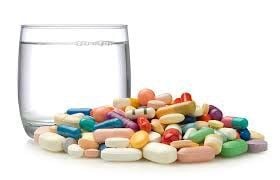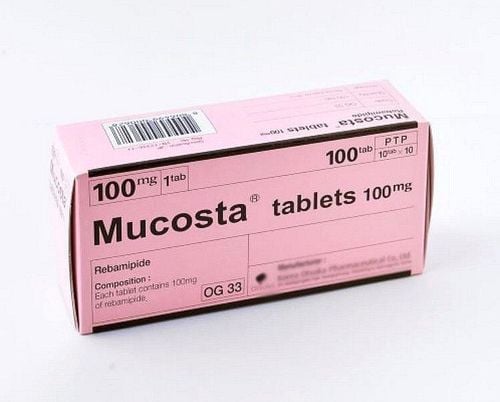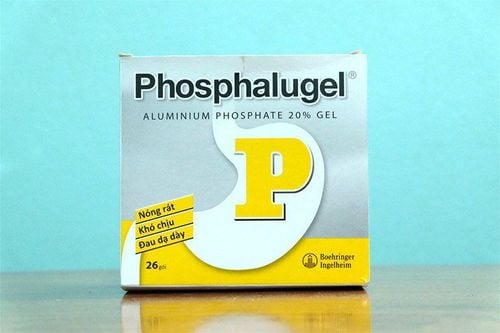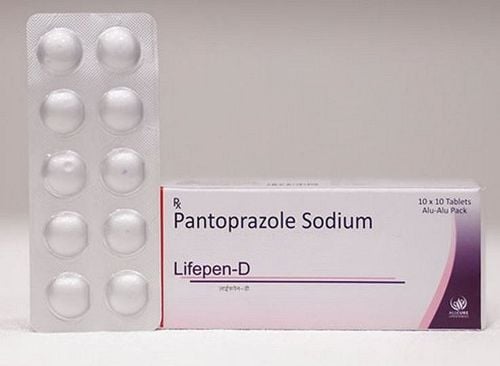This is an automatically translated article.
For patients who need to reduce the amount of acid in the stomach, support the treatment of abdominal pain, heartburn, indigestion, Aluminum hydroxide is one of the drugs of choice. This article will introduce to you what Aluminum hydroxide is, its uses and safe use.
1. What is Aluminum hydroxide?
Aluminum hydroxide is an antacid - a group of gastrointestinal drugs prepared in many forms such as capsules (475mg content); capsule (content 300mg, 500mg, 600mg); film-coated tablets (600mg strength) or suspension (320mg/5ml, 450mg/5ml, 600mg/5ml, 675mg/5ml).
When taken orally, aluminum chloride is the result of a slow reaction between aluminum hydroxide and hydrochloric acid in the stomach to be dissolved, a small amount is absorbed into the body. Excess food causes the drug to pass out of the stomach more slowly, prolongs the reaction time of gastric hydrochloric acid with aluminum hydroxide, and causes the amount of aluminum chloride to increase higher.
In the small intestine, the process of digestion causes aluminum chloride to be rapidly converted into insoluble alkaline aluminum salts, poorly absorbed. Aluminum salts can be a mixture of aluminum hydroxide, alkaline carbonate, oxyaluminum hydroxide and aluminum soap.
Phosphate in food also combines with aluminum hydroxide and also coordinates in the small intestine to form aluminum phosphate insoluble, not absorbed in the digestive tract and will be excreted in the feces.
Aluminum hydroxide is not metabolized. In people with normal kidney function, only about 17-30% of the aluminum chloride formed is absorbed into the body and eliminated very quickly by the kidneys. In patients with renal failure, there is a greater risk of aluminum accumulation (especially in the central nervous system and in the bones) leading to aluminum toxicity.
Absorbed aluminum will bind to serum proteins (eg, albumin, transferrin) so it will be difficult to remove by dialysis, most of the aluminum remaining in the digestive tract will form poorly absorbed aluminum salts and is excreted in the feces.
Aluminum hydroxide dry gel is an amorphous powder, insoluble in water or alcohol. This powder contains up to 50 to 57% aluminum oxide as hydrated oxide and may contain varying amounts of aluminum carbonate and bicarbonate.
Aluminum hydroxide is an inorganic salt used as an ingredient in antacids. Aluminum hydroxide reacts with excess hydrochloric acid in the stomach to reduce acid levels in the stomach, which is effective in reducing the symptoms of peptic ulcers, heartburn, heartburn or bloating, and acid reflux. - Esophageal .
The nature of aluminum hydroxide causes constipation, so the drug is often taken with antacids containing magnesium (magnesium hydroxide or magnesium oxide) - this is a laxative effect.
Food phosphate in the stomach and intestines also binds with Aluminum hydroxide to form insoluble complexes and thereby reduce phosphate absorption. Because of the above mechanism, aluminum hydroxide is also used to treat hyperphosphatemia in people with secondary hyperparathyroidism or renal failure.
2. Indications and contraindications to the drug Aluminum hydroxide
Indications for the use of Aluminum hydroxide in the following cases:
Relief of symptoms caused by increased stomach acid (such as heartburn, heartburn, flatulence, bloating, indigestion due to increased gastric acid) ; Patients with manifestations of increased gastric acid due to gastric ulcer, duodenal; Prevention and treatment of ulcers or bleeding of the stomach and duodenum caused by excessive stress; Treatment of symptoms of gastroesophageal reflux disease - oesophagitis; Hyperphosphatemia associated with a low phosphate diet. Do not use Aluminum hydroxide (aluminum hydroxide) for the following cases:
Hypersensitivity to aluminum hydroxide; People with hypophosphatemia; Children are young because of the risk of aluminum toxicity, especially those who are dehydrated or have kidney failure.
3. Side effects of the drug Aluminum hydroxide
Common side effects or possible health problems when using Aluminum hydroxide include:
Nausea; Vomiting Reversible increase in secretions; Aluminum poisoning; Low blood phosphate (low blood phosphate); Constipation (this can lead to hemorrhoids or bowel obstruction); Fecal reaction; Stomach cramps; Milk alkaline syndrome; Soften bones. Serious side effects of aluminum hydroxide include:
Mental/mood changes (eg, confusion, poor sleep); Pain when urinating; Stomach or abdominal pain; Vomiting looks like coffee grounds.
4. Interactions with other drugs
Aluminum hydroxide may alter the absorption of some drugs when taken with the following drugs: Iron salts, isoniazid, digoxin, indomethacin, allopurinol, corticosteroids, penicillamine, benzodiazepines, ranitidine, ketoconazole, phenothiazines, itraconazole. Therefore, it should be taken away from antacids.Absolutely do not share: Aluminum hydroxide in dry gel form reduces the absorption of tetracyclines when used together due to complex formation.
5. How to use Aluminum hydroxide?
5.1. Use of aluminum hydroxide for adults To combat excess gastric acid:
Depending on the amount of gastric acid secreted and the buffering capacity of each individual preparation, the dose required to neutralize stomach acid varies depending on according to each patient. In vivo, the acid-neutralizing capacity of equal-volume antacids with antacid preparations varied greatly. If the drug is taken on an empty stomach, the time for the drug to take effect is about 20 to 60 minutes, but if you take it about 1 hour after a meal, the acid-neutralizing effect of Aluminum hydroxide can last up to 3 hours. lake. Antacids in suspension form are easier and better to dissolve than powders and tablets, and therefore have a better ability to neutralize gastric acid. That's why antacid suspensions are preferred over powders and tablets. But not everyone can drink this form of suspension, especially for those who are quite sensitive because they are a bit difficult to drink and easily cause a sore throat. Tablets need to be chewed well before swallowing. The maximum recommended dose for symptomatic treatment of gastrointestinal disorders, dyspepsia, should not be used for more than 2 weeks, unless on the advice of a doctor or under the supervision of a physician. Treatment of gastric and duodenal ulcers:
Usually: Dose of 15 - 45 ml, each time taken 3 to 6 hours apart or 1 to 3 hours after eating and before going to bed. For patients with uncomplicated duodenal ulcers, to achieve the full antacid effect at the optimal time, antacids should be taken 1 to 3 hours after meals and at bedtime to prolong the median effect. peace. An extra dose of pain medication may be taken between the prescribed doses. Medicines are usually given for 4-6 weeks, and if you have a stomach ulcer, antacids are usually given until the ulcer is completely gone. Gastroesophageal reflux:
Take Aluminum hydroxide every 1 hour. If symptoms persist, it can be given every 30 minutes. If long-term treatment, take the drug 1 and 3 hours after eating and at bedtime. Prevention of gastrointestinal bleeding, stress ulcers:
Use 30 - 60 ml/dose, every 1 hour. For gastrointestinal bleeding, antacids must be adjusted to maintain nasogastric aspirates at a pH >3.5. For severe cases, the antacid suspension must be mixed with water or milk and given continuously into the stomach. Dosage adjustment is required to maintain gastric pH >5. Hyperphosphatemia:
Along with a phosphate-restricted diet, give aluminum hydroxide suspension 30-40 ml, 3 or 4 times a day. Take 500 - 1800 mg, 3 - 6 times / day, orally between meals and at bedtime, preferably with meals or within 20 minutes after eating. To reduce the risk of aspiration of gastric acid during anesthesia:
Give an antacid suspension 30 minutes before anesthesia. 5.2. Dosage for children Treatment of stomach ulcers:
Children: 5 - 15 ml, aluminum hydroxide suspension, every 3 - 6 hours or 1 to 3 hours after meals and at bedtime. Prevention of gastrointestinal bleeding:
Children: 2 - 5 ml/dose, once every 1-2 hours. Older children: 5 - 15 ml/dose, once every 1-2 hours. Dosage adjustment is required to maintain gastric pH > 5. Hyperphosphatemia:
Along with a phosphate-restricted diet, give a suspension of aluminum hydroxide 30-40 ml, 3 or 4 times a day. Use 50 - 150 mg/kg/24 hours, divided into small doses, take 4-6 hours apart; The dose is adjusted to keep serum phosphate in the normal range. 5.3. Some notes when using the drug Aluminum hydroxide It should be used with caution in people with congestive heart failure, kidney failure, edema, cirrhosis of the liver and low sodium diet and with new gastrointestinal bleeding. Elderly people, due to illness or drug treatment may experience constipation and solid stools. Care should be taken about drug interactions. Periodically check monthly or every 2 months serum phosphate levels for patients on hemodialysis and long-term use of aluminum-containing antacids. Above is the information about the drug Aluminum hydroxide, you can refer to the effective and safe use of the drug for health.
Please dial HOTLINE for more information or register for an appointment HERE. Download MyVinmec app to make appointments faster and to manage your bookings easily.













